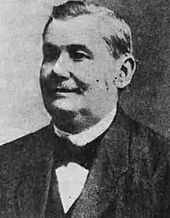Manuel Fernández Juncos facts for kids
Quick facts for kids
Manuel Fernández Juncos
|
|
|---|---|

Fernández Juncos wrote the lyrics to La Borinqueña, Puerto Rico's national anthem.
|
|
| Background information | |
| Born | December 11, 1846 Tresmonte, Ribadesella, Asturias, Spain |
| Died | August 18, 1928 San Juan, Puerto Rico |
| Occupation(s) | Journalist, poet, author, humanitarian |
Manuel Fernández Juncos (born December 11, 1846 – died August 18, 1928) was a writer and helper of people. He was born in Spain but became a Puerto Rican. He is famous for writing the official words to "La Borinqueña," which is Puerto Rico's national anthem.
Contents
Manuel's Early Life
Manuel Fernández Juncos was born in a place called Tresmonte, in Ribadesella, Asturias, Spain. He became an orphan when he was very young. In 1858, he traveled to Puerto Rico on a Spanish ship. He loved the island so much that he made it his home for the rest of his life.
Manuel met a poet named Dr. José Gualberto Padilla. Dr. Padilla, also known as "El Caribe," inspired Manuel to become a writer. Manuel started writing for a newspaper called El Progreso (which means Progress). This newspaper was started by José Julián Acosta. He also wrote for other newspapers like Porvenir and El Clamor del País.
Starting Newspapers
Fernández Juncos started many of his own newspapers. These papers often shared ideas about freedom and fairness. One of his most famous papers was called El Buscapie. This paper supported the idea that every child should get a free education. It quickly became the most popular newspaper in Puerto Rico at that time. He also created Revista Puertorriqueña (The Puerto Rican Magazine).
As a writer, Manuel studied and wrote about the history and culture of the Puerto Rican people. Some of his important books include Tipos y Caracteres, Libro Cuarto de Lectura, and Canciones Escolares. He wrote Canciones Escolares with Virgilio Dávila and Braulio Dueño Colon. El Buscapie was the only newspaper on the island that openly criticized the local government. In 1893, he helped start a group called the Masonic Lodge Patria No. 61 in San Juan, Puerto Rico. He was also its first leader.
Working for Puerto Rico
Fernández Juncos joined the Autonomist Party. This party wanted Puerto Rico to have more control over its own government, separate from Spain. He became the party's secretary. When Puerto Rico gained some self-rule from Spain, Fernández Juncos was chosen to be the first Secretary of State.
However, this self-rule did not last long. Less than a year later, the United States took over Puerto Rico during the Spanish–American War. The island's government was then changed. After this, Manuel started the Puerto Rican Red Cross. This organization still helps people in need today.
Helping with Education
After the war, the United States wanted to make Puerto Rico more like America. This included making English the main language in schools and government. Because of this, schools needed books written in English. Fernández Juncos believed that this would be hard for most Puerto Ricans, who only spoke Spanish. So, he took on the job of changing, translating, and writing books for the schools. Later, he also started a home for orphaned children in San Juan called "Casa Manuel Fernández Juncos."
The National Anthem: "La Borinqueña"
Manuel Fernández Juncos wrote the words for "La Borinqueña," Puerto Rico's official anthem. The music for this song was first written by Francisco Ramírez in 1860. (Sometimes people also credit Félix Astol Artés in 1867).
The first words for the anthem were written by Lola Rodríguez de Tió in 1868. However, these words were seen as too rebellious for public use. In 1903, a public competition was held to find new lyrics for the song. Fernández Juncos won this contest. This is why a person born in Asturias, Spain, wrote the lines, "The land of Borinquen / where I was born." "La Borinqueña" officially became the anthem of the Commonwealth of Puerto Rico in 1952.
- Official Anthem of the Commonwealth of Puerto Rico — "La Boriqueña"
|
La tierra de Borinquen |
The land of Borinquen |
Manuel's Legacy
Manuel Fernández Juncos passed away on August 18, 1928, in San Juan, Puerto Rico. He was buried at the Santa María Magdalena de Pazzis Cemetery in San Juan. The government of Puerto Rico has honored him in many ways. They named three schools after him in the cities of Mayagüez, Juana Diaz, and Cabo Rojo. A main street in San Juan is also named after him.
A United States Postal Service Post Office in Santurce, Puerto Rico was named the Fernandez Juncos Post Office.
See also
 In Spanish: Manuel Fernández Juncos para niños
In Spanish: Manuel Fernández Juncos para niños
- List of Puerto Ricans
 | John T. Biggers |
 | Thomas Blackshear |
 | Mark Bradford |
 | Beverly Buchanan |

